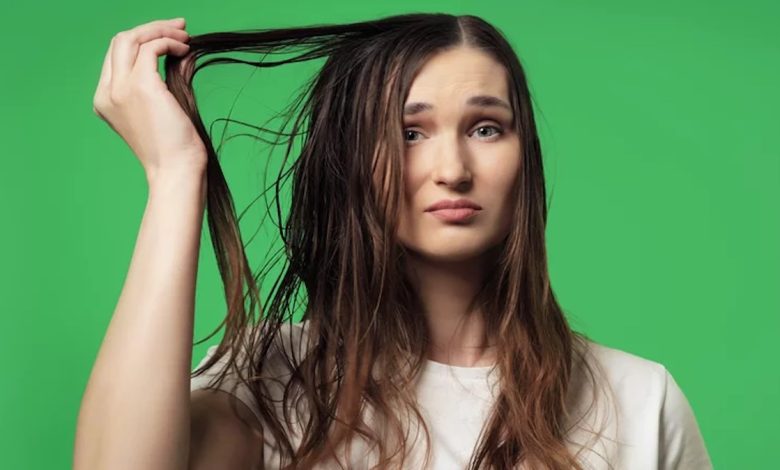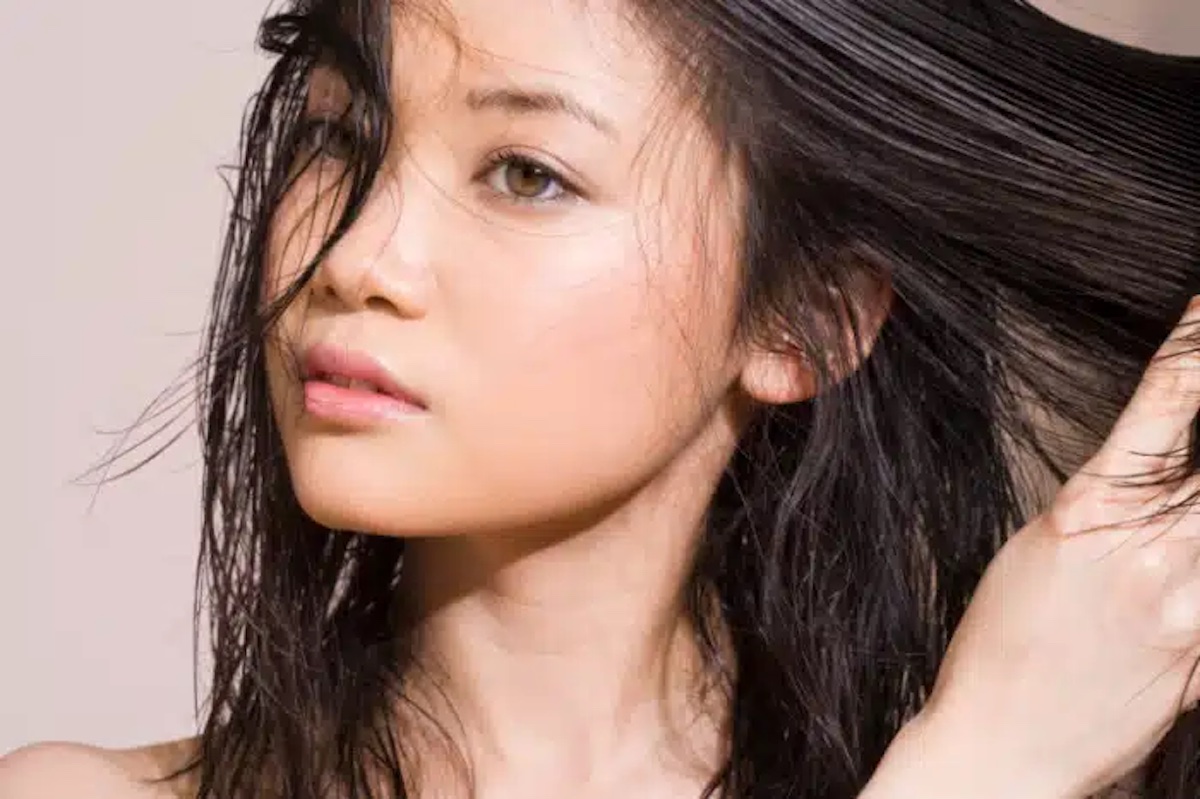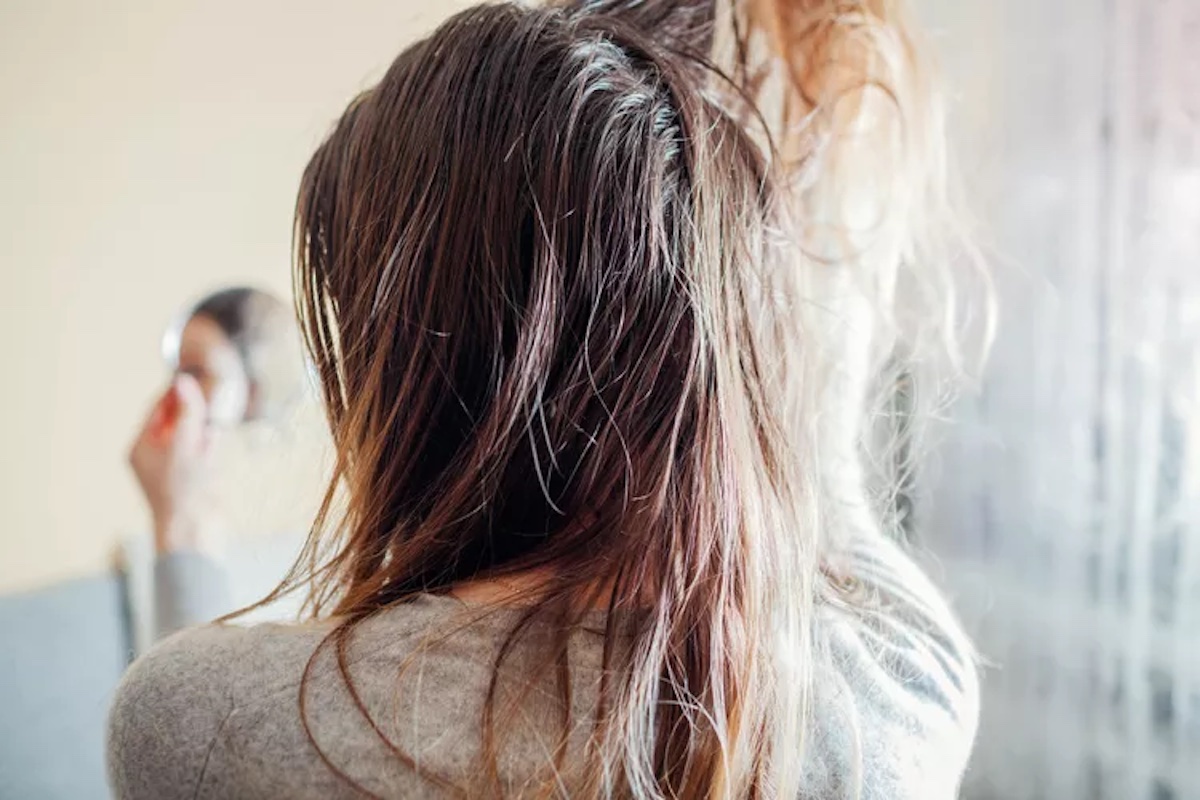Oily Hair: What Causes Wet and Shiny Symptoms?

Oily Hair: Oily hair is hair that appears greasy or wet. It occurs when your scalp’s sebaceous (oil) glands produce excess oil. Common causes include washing infrequently and hormonal fluctuations. You can usually manage oily hair by washing hair frequently enough, concentrating shampoo on the scalp, and avoiding conditioner near the scalp.
This article covers causes and treatments for oily hair. It also explains the best way to style oily hair and which products can worsen it.
Causes: Why Is My Hair Oily?
While common causes of oily hair include hair-washing routines, some medical issues can also lead to it.
Hormonal Fluctuations
During a menstrual cycle, the shift in estrogen and progesterone can result in changes to the skin. An increase in skin oil production is why people commonly notice hormonal acne around their period. The same may be true for some people with oily hair. Pay attention if it occurs in a cyclic pattern. If so, your hormones may be to blame.
Similarly, testosterone increases oil production. People with polycystic ovary syndrome (PCOS), which is characterized by elevated testosterone, may notice symptoms like oily skin. This could also include the scalp, making the hair appear greasy.
Skin Conditions
Oily Hair, Some skin conditions that affect the scalp may result in greasy hair. Seborrheic dermatitis (a scaly condition of the scalp and face) affects oil-producing glands.4 In addition to redness, flaking, and crusting, you may also notice greasy hair.
Scalp Yeast Infection
A scalp yeast infection (Candida) can include symptoms of moist skin and greasy patches. It makes sense then that those greasy symptoms would extend to the hair, making it appear oily.
Parkinson’s Disease
One of the common conditions associated with Parkinson’s disease is seborrheic dermatitis.6 If you have Parkinson’s, you may be more prone to this scalp condition and oily hair. In addition, another related symptom is excess sweating. If you sweat on your scalp, you will also likely notice greasy hair.

Which Shampoo and Conditioner Makes Oily Hair Worse?
Shampoos and heavy or moisturizing conditioners can worsen your oily hair because they may tend to weigh your hair down. To keep hair from getting greasy, keep shampoo concentrated on the scalp to wash away the scalp oil. With conditioner, do the opposite—focus it at the mid-section to the ends and keep it away from the scalp.
Experts also recommend choosing a shampoo and conditioner made for your hair type. If you color your hair, choose a shampoo for color-treated hair; if you have dandruff, use a dandruff shampoo.
Why Does My Hair Get Oily So Fast?
Some people produce scalp sebum faster than others. This could be due to genetics. It could also be that you are washing your hair too infrequently, using the wrong shampoo for your hair type, or have other contributing factors, like skin or health conditions predisposing you to an oily scalp.
What About Styling and Texture Products?
Since many styling products are weighty to hold hair in place and create texture, you’ll need to be careful when choosing one if you have oily hair. The wrong product can make oily hair look greasy instantly.
Oily Hair, Avoid weighty pomades, waxes, and gels. And steer clear of hair oils. Opt instead for lighter hairsprays and mousses.
Natural Treatment for Oily Hair
In addition to washing and conditioning correctly, there are some other things you can do to combat oily hair. These include:
Using dry shampoo between washes
Brushing your hair regularly to distribute the oils throughout the length of your hair
Using a clarifying shampoo regularly (perhaps weekly) to remove product build-up
Using a scalp scrub to exfoliate your scalp skin (weekly)
How many days a week should you wash oily hair? It depends on your hair type. For those with African American hair, aim for every one to two weeks.
Straight hair, however, should be washed most frequently since it tends to show grease more readily than curly and coarse hair. One study found participants were most satisfied with their hair and scalp condition when they washed five to six times per week.

Medical Treatment for Oily Hair
If an underlying medical condition causes your oily hair, treating that condition is the best way to combat an oily scalp. For example, if you have a hormonal imbalance from your menstrual cycle or PCOS, some types of birth control may help control oily skin.
Over-the-counter (OTC) or prescription dandruff shampoos may resolve an oily scalp if you have seborrheic dermatitis. If you have a scalp yeast infection, antifungal medication to resolve the infection may also fix greasy hair.
How to Style Oily Hair
Oily Hair, Choosing the right style may be just the trick if you’re wondering how to make your hair look less greasy. Ponytails, braids, and buns are good choices if your hair is longer because they keep it in place and hide oily roots.
For any hair length, covering your scalp is another good option. Go for scarves, headbands, hats, and hair clips. Parting your hair on the side instead of the middle may also cover more of your oily roots.
Summary
Oily hair occurs from too much scalp oil. This most commonly happens from washing too infrequently. But it can also occur from hormonal imbalances and some skin and health-related conditions. Using the right shampoo, conditioners, and styling products formulated for your hair type is often all that’s needed to correct the problem.
Also Read:
4 reasons why you need to try cooling peppermint oil for hair growth
11 Natural Home Remedies For Dry and Frizzy Hair Try
5 ways in which excessive sweating is damaging your hair
6 mind-blowing ways in which methi seeds can be your skin and hair’s BFF




